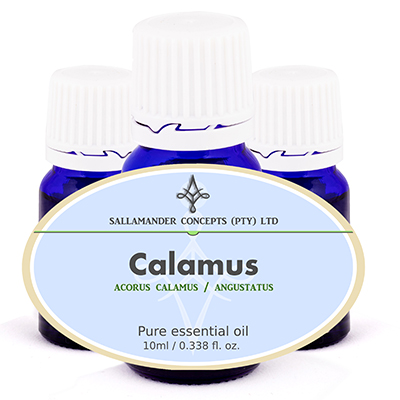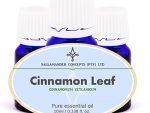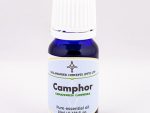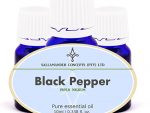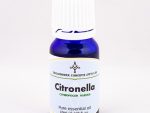Calamus essential oil information
Calamus essential oil is extracted from Acorus calamus var. angustatus of the Araceae family. Common names for Calamus include Jammu calamus and sweet flag
Properties
Calamus oil has a warm, spicy odor – reminiscent of a sweet forest.
Origin
It is a perennial, semi-aquatic, marshy plant, native to northern Europe and Asia.
The root of this plant is used in herbal medicine for the treatment of nervous complaints, vertigo, headaches, neuralgia, shock, epilepsy, panic attacks and dysentery.
Extraction
This essential oil is extracted from the fresh roots or the unpeeled dried root by steam distillation.
Chemical composition of Calamus essential oil (tetraploid)
The main chemical components are β-Asorone, Isoeugenol, Calamenene, Calamene, Calamol, Asaronaldehyde, Methyl isoeugenol, Methyleugenol and α-Asorone
Suggested precautions
Calamus oil contains a high percentage of the potentially carcinogenic compound known as β-Asorone.
We recommend that this essential oil be avoided for use in children, pregnancy and when breastfeeding.
No known cases of cancer in humans have been linked to the use of Calamus essential oil (as of 2021), but certain studies done on rodents report a carcinogenic effect.
IFRA recommends that this oil be avoided for use in fragrances and that the level of asorone in any product should be kept lower than 0.01%. IFRA also suggests that the level of Methyleugenol be kept lower than 0.0004% in any leave-on product (face cream or body creams and lotions).
Calamus oil is known to be one of the oils mentioned in the bible in Exodus 30. We make a blend called Exodus 30 Anointing Blend, which includes this oil at an EXTREMELY low percentage.
Please read our page with heading: Safety with Essential Oils before using this oil.
We recommend the following book as an excellent resource regarding safety:
Essential Oil Safety: A Guide for Health Care Professionals by Robert Tisserand & Rodney Young (#ad)
Therapeutic properties of Calamus essential oil
The therapeutic Properties for the essential oil are antibiotic, antispasmodic, circulatory, cephalic, stimulant and nervine.
Uses
Calamus essential oil should rather be avoided for use on the skin.
Certain studies and reports suggest that the asorone contained in Calamus oil can cause convulsions and hallucinations if taken internally (orally). We recommend a low dilution rate in an anointing blend (0.02% and lower)
Burners and Vaporizers
In vapour therapy, Calamus essential oil can help to treat headaches and panic attacks. The oil is said to promote calmness, harmony, improve memory and clear the mind.
Suggested dilution rates
On the skin:
We suggest that this essential oil rather be avoided for use on the skin.
A maximum dilution rate of 0.02% is suggested. Use seldom and intermittently – avoid prolonged use.
We suggest that this oil be avoided in pregnancy, when breastfeeding and in children under the age of 15.
Burners and Vaporizers
Up to 8 drops can be diffused into a room to help with panic attacks, headaches and to clear the mind.
Summary
Although Calamus oil was banned by the FDA in 1968 as a food additive and as a medicine, our Calamus essential oil is only recommended for external use in extremely low dilution rates and in an anointing oil blend. Current research shows that Calamus essential oil is moderately toxic, hepatotoxic (liver) and potentially carcinogenic.
We do NOT recommend the ingestion of this essential oil.
When used on the skin, we recommend that this essential oil only be used in extremely low dilutions on adults with unbroken skin (dilution rate of 0.02% and lower). Use on the skin should be intermittent and rare – avoid prolonged use.
No precautions are suggested when using in a room diffuser at normal dilution rates as suggested above. Do not use in other forms of vapor therapy.
Take care when handling this essential oil in its pure form and limit use. Wash and rinse hands thoroughly after handling this essential oil.
We can find no direct evidence to suggest that this essential oil causes cancer in humans, but the high percentage of β-Asorone found in this essential oil is reason for concern.
Calamus essential oil blends well with
Calamus essential oil goes particularly well with Cinnamon, Cedarwood, Clary Sage, Lavender, Patchouli, Rosemary, Tea tree and Ylang-ylang.

